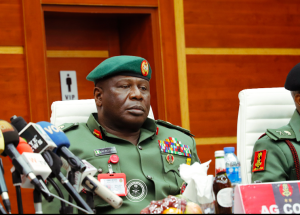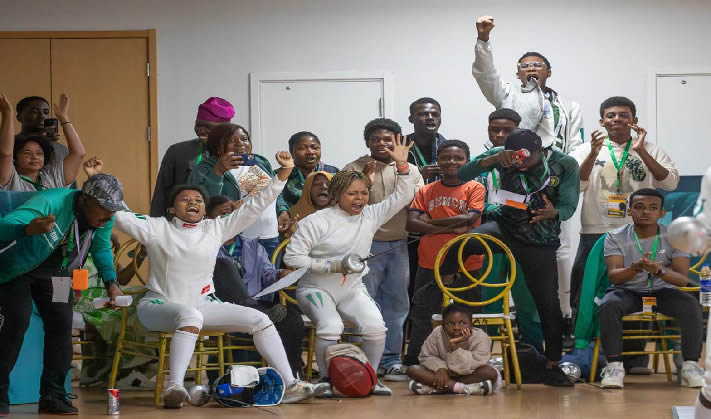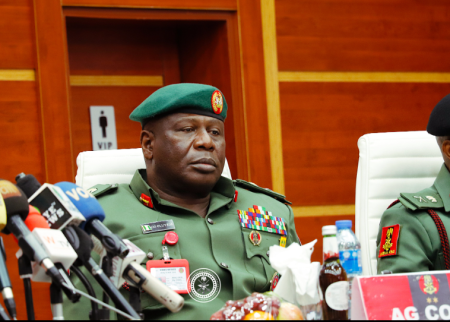Paragraph 1: Nigeria’s Historic Triumph in Women’s Epee
The 23rd African Fencing Championships, held in Lagos, Nigeria, witnessed a historic moment as the Nigerian women’s epee team secured their first-ever victory in the competition. The team, comprising Somtochukwu Eribenne, Sara Idongesit, and Adebodunirin Thomas, faced a challenging quarter-final loss against Algeria but rallied to finish strong. Their determination culminated in a resounding 45-40 victory against Benin Republic in the classification match for fifth place, sparking jubilation among the home crowd. This landmark achievement not only marked a significant milestone for Nigerian fencing but also instilled a newfound confidence in the team, bolstering their prospects for future competitions.
Paragraph 2: Egypt’s Dominance and the Men’s Foil Competition
Egypt continued its reign of dominance in African fencing, capturing the overall championship title at the Lagos tournament. Their prowess was particularly evident in the men’s team foil event, where they showcased exceptional skill and teamwork. The Egyptian team, boasting the talents of 2025 men’s foil champion Abdelrahman Tolba, alongside Karim Medhat, Mohamed Hamza, and Sief Elghayesh, cruised through the semi-finals with a commanding 45-9 victory over Nigeria. In the final, they faced Angola, who had secured their place through a dramatic 45-44 win over Algeria in the semis. Despite Angola’s valiant efforts, Egypt’s superior form proved insurmountable, leading them to a convincing 45-23 victory and another gold medal.
Paragraph 3: Women’s Epee and Sabre Finals: Egypt’s Golden Streak Continues
The women’s epee final was marked by controversy as the match between Egypt and Algeria was abruptly halted at a 6-6 tie. Algeria’s refusal to continue resulted in a P. Black decision, awarding the gold medal to Egypt. This added another gold to Egypt’s burgeoning medal tally. In the women’s team sabre final, Egypt once again asserted its dominance, with Alanoud Hegazy, Nada Hafez, Nagwa Nofal, and Renad Eldoksh leading the team to a 45-40 victory over Algeria. This consistent display of skill and strategy solidified Egypt’s position as the leading fencing nation in Africa.
Paragraph 4: Comprehensive Overview of the Medal Standings
Egypt’s exceptional performance throughout the championships culminated in an impressive haul of 11 gold, 5 silver, and 5 bronze medals, firmly placing them at the top of the medal table. Kenya secured the second position with a single gold medal, while Tunisia claimed third place with 2 silver and 2 bronze medals. Algeria finished fourth with 1 silver and 6 bronze medals, followed by Ivory Coast and South Africa, each with 1 silver and 1 bronze. Angola secured a silver medal, while Morocco, Cape Verde, and Senegal each earned a bronze medal, reflecting the competitive landscape of African fencing.
Paragraph 5: The Tournament’s Scope and Participation
The 23rd African Fencing Championships, hosted by the Nigeria Fencing Federation at Charterhouse, Lagos, spanned five days and encompassed 12 events. The tournament attracted a diverse field of over 120 fencers representing 18 countries across the African continent. This wide participation underscored the growing popularity and development of fencing in Africa, with nations showcasing their talent and competing at the highest level. The event served as a testament to the unifying power of sport, bringing together athletes from various backgrounds to celebrate athleticism and sportsmanship.
Paragraph 6: Significance and Impact of the Championships
The 23rd African Fencing Championships held significant implications for the development and promotion of fencing across Africa. Beyond the individual and team achievements, the tournament provided a platform for athletes to gain valuable experience, foster camaraderie, and elevate their competitive skills. The success of Nigeria’s women’s epee team served as an inspiration, demonstrating the potential for growth and progress within the sport. The championships also highlighted the continued dominance of Egypt in African fencing, setting a high standard for other nations to aspire to. Overall, the tournament served as a crucial stepping stone in the ongoing evolution of fencing in Africa, paving the way for future generations of fencers.














